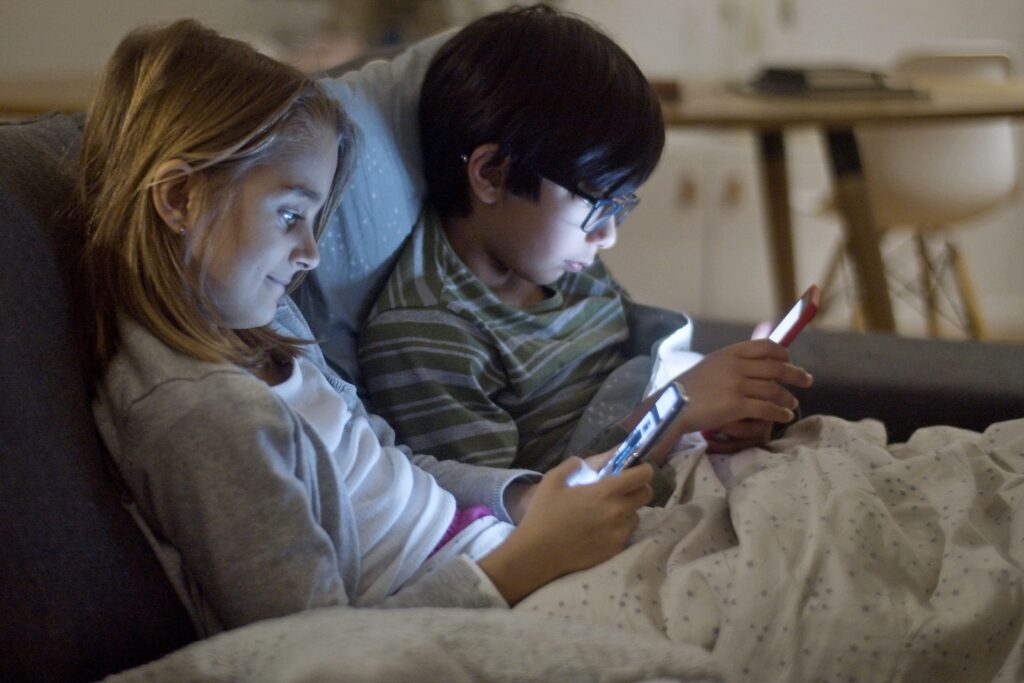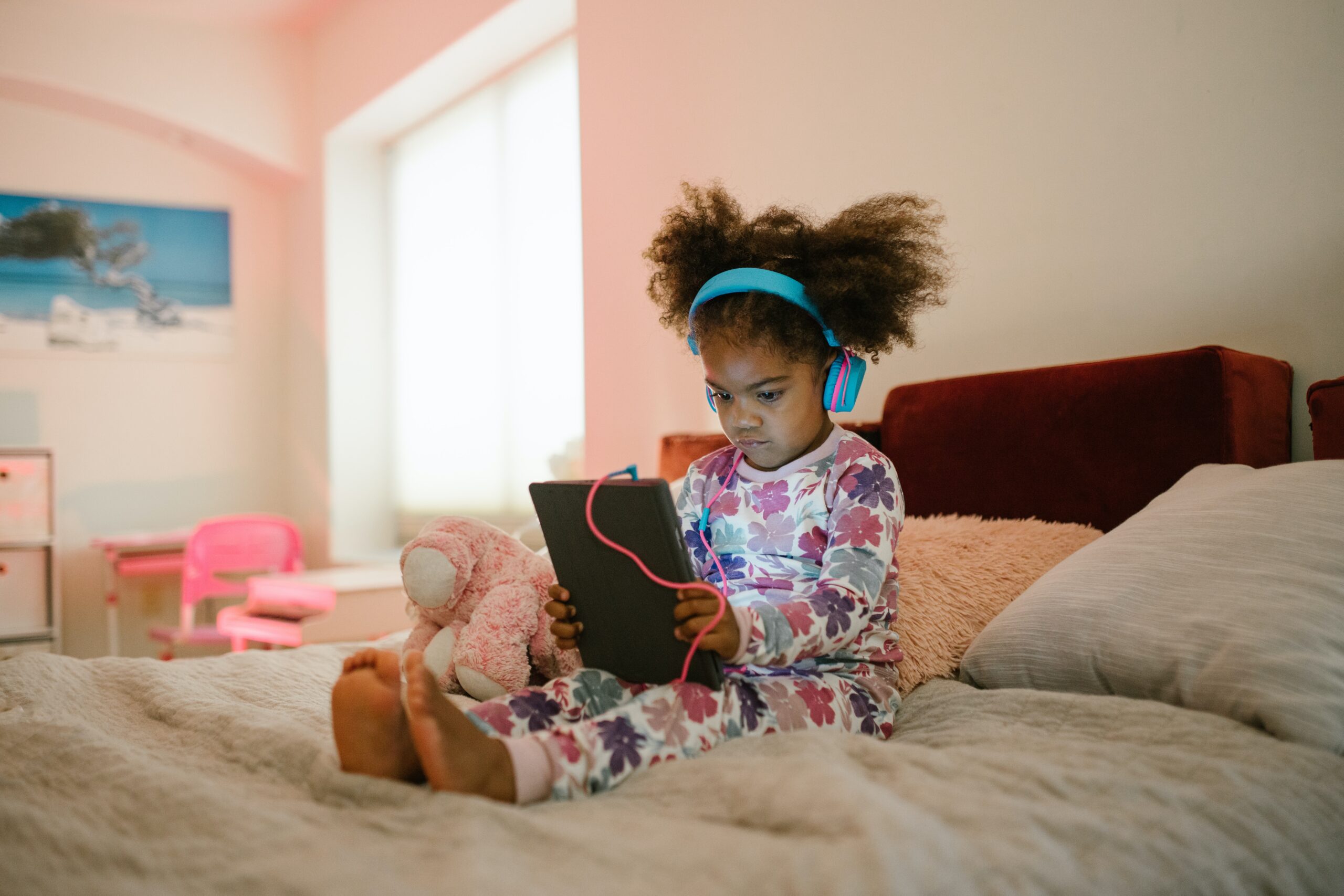Navigating screen time for our kids can be tricky but vital to their health and development. Here are seven reasons to limit the kids screen time.
“I’m bored!!!”
We have all heard this at some point from our children. As busy parents who are juggling work demands, household responsibilities, and social obligations and raising our kids, we are grateful for activities that engage and occupy our children to use our time in productive ways. And sometimes, we need to relax and have a cup of coffee without having to entertain a four-year-old. It is effortless to turn to tablets, computers, and video games in these moments, but this is not always the best choice.
Todays’ kids are spending an excessive number of hours looking at screens. School closures during the pandemic forced us to sit our children in front of a computer screen for their entire school day, and this is considered instructional screen use. And of course, there are also the activities the kids themselves want to use screens for, like teens texting their friends on cell phones, preschoolers watching YouTube videos, and second graders playing Minecraft.
Table of Contents
Guidance of Screen Time by Kids Age Group
As parents, we hear about the need to limit screen time, and both American academy of child and adol psychiatry and American Academy of Pediatrics published guidelines for screen time hours by age group.
- Until 18 months of age limit screen use to video chatting along with an adult (for example, with a parent who is out of town).
- Between 18 and 24 months screen time should be limited to watching educational programming with a caregiver.
- For children 2-5, limit non-educational screen time to about 1 hour per weekday and 3 hours on the weekend days.
- For ages 6 and older, encourage healthy habits and limit activities that include screens.
- Turn off all screens during family meals and outings.
- Learn about and use parental controls.
- Avoid using screens as pacifiers, babysitters, or to stop tantrums.
- Turn off screens and remove them from bedrooms 30-60 minutes before bedtime.

When you consider how much time our kids spend looking at screens, this might make sense. But why? Here are seven reasons we as parents may want to limit screen time.
1. To improve brain performance
Using screens for non-instructional purposes such as watching videos or playing video games affects how a child’s brain functions. Kids with higher amounts of this type of screen time have a decreased ability to focus on a task, and they also have a reduced capacity to take in and remember new information. This can result in academic struggles.
2. To improve mental health
Researchers have linked increased amounts of screen time to increased depression which the World Health Organization has predicted will be the leading cause of poor health by 2030. While this is an ongoing area of study, the mental health effects of screen time should not be underestimated.
3. To improve body health
There are many adverse effects of screen time on the body: posture. Kids are suffering more and more from neck and back pain due to screen use, now referred to as ‘tech neck. That position is all too familiar: our child curled up on the couch, staring down at their tablet. Since postural habits are built in childhood, this can lead to lifelong posture problems.
Another health effect is increased obesity. If a child is looking at a screen, they are not being active, and they are missing out on chances to exercise and move their bodies. They are sedentary and do not participate in healthy activities that contribute to maintaining a healthy weight.
And a third effect is poor eating habits. Watching TV means kids are inundated with advertisements for unhealthy foods: sugary cereals, high-calorie sodas, and french fries. This promotes poor food choices and leads to health problems and increased weight gain.
4. To improve sleep
Screen time affects sleep in 2 ways. First, staying up late texting and chatting with friends means less sleep overall. Second, even if they are not missing sleep from staying up late, kids looking at a screen in the evening are exposed to the blue light emitted by the screen. This blue light affects the brain’s melatonin production, an essential hormone for falling asleep quickly and early enough to achieve healthy sleep. Without healthy sleep, brain function deteriorates. Sleepy children have difficulty staying awake during class, paying attention to the information presented to them, and managing their behavior.
5. To improve behavior management
Screen time is linked to violent behavior. While there has been some debate about the veracity of this claim, studies like The National Television Violence Study have linked increased aggression in kids with exposure to violence on the screen through media and video games. Children looking at violent images have shown increased aggressive thoughts and behaviors and increases in angry feelings.
6. To improve social skills
Every hour spent watching a screen is an hour not spent interacting live with people. Children and teens learn to navigate life and society through these live interactions. Kids need to know non-verbal cues, how their words affect others, and how to problem-solve and manage conflict. Increased screen time is related to struggling with observing and practicing these social norms.
Additionally, kids with a high volume of screen hours can struggle with self-regulation and creative thinking, which are crucial to success in adulthood. Sometimes, digital devices are used to calm an irritable child or combat boredom. That child then misses an opportunity to develop and practice the skill of calming themselves down. Or they miss a chance to exercise their creativity and write an unbelievable story, draw a beautiful picture, or invent a new game.
7. To improve internet habits
Using the internet productively is an essential skill in the 21st century and will be vital for our children to learn as they head toward adulthood. However, spending many hours on the internet, especially at a young age and unsupervised, can lead to unhealthy internet habits. Teens can end up on inappropriate websites that can foster addictive behaviors. Chat forums can quickly turn into cyberbullying, which negatively affects self-esteem. Children can struggle with managing privacy and put themselves and others at risk.
What to do about it
Choosing to limit a child’s screen time can be difficult. Digital devices are convenient and engaging for our kids. So what do we do knowing that these devices also can harm? Here are a couple of tips:
Talk to your kids about screen time and the internet.
- Make sure they know this is about health and not punishment.
- Engage them in problem-solving conversations to create a plan together.
- Educate yourself and them about internet safety.
- Continue to dialogue about this, so you are up to date on how your kids are using digital devices and how this changes.
- Be a good model. Let them see you following the rules too.
Set some clear boundaries with your kids.
- Establish a time limit before you hand the tablet to your 6-year-old. “You can play on the tablet for 30 minutes. After that we will put the tablet away and it will be time for playing outside.” Then set a timer and stick to it.
- Work with your teenager to create an appropriate phone use schedule.
Implement parental controls.
- Look at each device and inquire of your internet provider about available controls.
- Limit access to inappropriate or dangerous types of websites.
- Establish strong passwords.
- Use devices together. Play Minecraft with your second grader!
- Friend your pre-teen on Facebook and follow your teenagers’ Twitter feed.
Digital devices and the internet are integrated into our lives more than ever before. With the increased prevalence of smart homes and increases in remote school and work, this will only increase. We must understand the effect that they have on us and our kids. And that we make plans to keep our families healthy.
In the end, I want to quote one of the TED talks inspired me on the subject from Dimitri Christakis and would like to share here.
About Me
Hi, there. I am Lin. Together with my husband and two kids, we live in the beautiful Netherlands in Europe. I am dedicated to self-development, creating quality time for the whole family, and fully supporting kids with their potentials and possibilities with all I have learned from engineering, MBA, and 10+ years of working experience in the energy sector.


